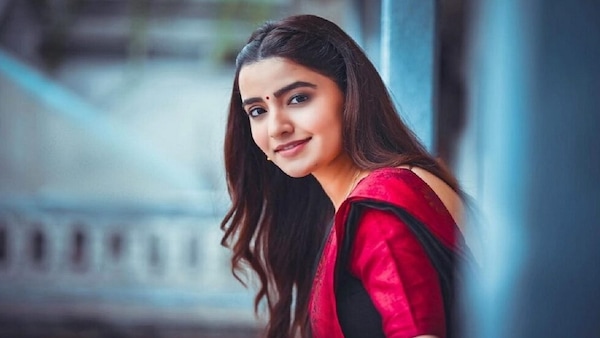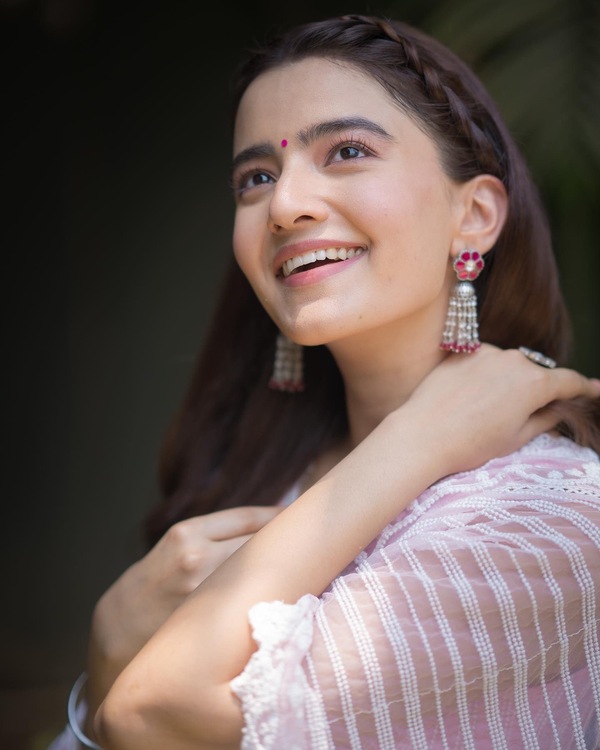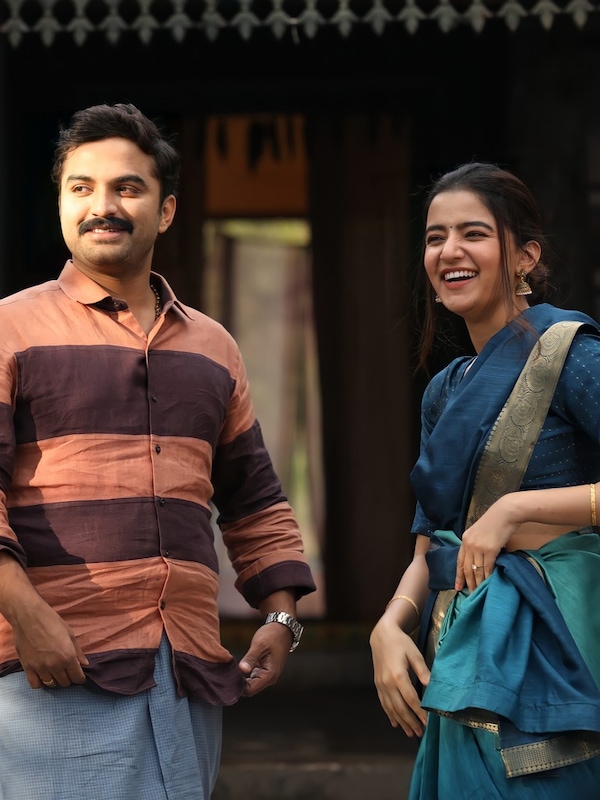Exclusive! Rukshar Dhillon on Ashoka Vanamlo Arjuna Kalyanam: When crowds understand a character without dialogues, there's great satisfaction
Coasting on the success of her latest release, Rukshar is finally happy to go beyond the staple girl-next-door roles and to have worked on a film that gave her an adrenaline rush in abundance

Last Updated: 09.09 PM, May 18, 2022
Every actor has one film in their career where they feel they've genuinely 'arrived' and come of age as performers. Ashoka Vanamlo Arjuna Kalyanam was that film for Rukshar Dhillon. Her dialogue sheet in the entire film wouldn't have gone beyond half a dozen pages and she had to give it everything to bring a submissive, introverted character like Madhavi to life. And boy, she relished that challenge and how!
Madhavi is a representation of what every girl goes through when she's forced by her parents into an arranged marriage without her consent. Rukshar showcases a woman's inner trauma with great effect through her silences, body language and minute nuances in a minimalistic manner. It's not a quintessential role by any means and she's over the mean learning of the applause from all corners for her solid performance.
In a tete-a-tete with OTTplay.com, Rukshar calls Ashoka Vanamlo Arjuna Kalyanam, a transformative experience that gave her a lot of satisfaction.
It's not every day that you get to play a character when audiences get to understand her through her awkward silences, expressions and not so much dialogue. How challenging was it to bring a character like Madhavi to life?
To be Madhavi, I had to unlearn what Rukshar had learnt in the past. Rukshar is very vocal, voices her opinions freely, and is independent. I've been brought up with a lot of freedom in my environment. Madhavi, unlike me, is brought up in a very conservative environment. My parents, for instance, would never think of an arranged marriage for me, they'd rather ask me to get married to a man of my choice. Playing Madhavi though, I had to understand where she was coming from. I had a lot of questions about Madhavi's choices, especially the timing of her decisions. There was an internal conflict between my real life and the character but I had to understand that was Madhavi's journey.
As an actor, you always had to justify why a character is behaving in a particular way, and why her family is behind her back to finalise this alliance. There are two kinds of people in the world - one who vocally expresses their opinions and the world doesn't take notice of them while the other lot speaks little but the world pays heed to their voice. Madhavi belongs to the second category. She may talk little but puts a lot of thought behind it.
What made Madhavi take a drastic step that she couldn't take her equation with Arjun forward anymore? It must have come after a lot of thinking. I couldn't reach that emotion without showing the entire graph and I had to convey that to audiences through my body language, and histrionics. The scenes pan out so well for Madhavi to reach that tipping point and express what's on her mind with Vasudha. It takes a lot of time for Madhavi to realise that she had to take charge of her life and choose her partner.

One of the major strengths of the film is the camaraderie that you share with Ritika Nayak, who plays your on-screen sister Vasudha. Did you enjoy the contrast between Vasudha and Madhavi?
It reminded me a lot of my elder sister and me. I am more like Vasudha in my real life while Madhavi as a character is similar to my elder sister. My elder sister is more mature, thinks, analyses and takes decisions after a lot of thought. Whereas, I live life in the moment and take decisions instinctively. My sister always advises to me think a lot before I commit to anything and I had a ready reference for Madhavi back home.
Ritika (Nayak) as Vasudha did a wonderful job and as I watched her on the screen, I was reminded of myself - spontaneous, one who follows her heart and doesn't care what the world says. I enjoyed the prospect of playing this wiser, elder sister to Vasudha. I started understanding my sister's mind better after playing Madhavi. Madhavi, in the film, ultimately confides in Vasudha and even when she (Vasudha) falls for Arjun later, doesn't judge them. Ultimately, the film suggests you do anything that makes you happy. Madhavi has chosen something that makes her happy and so has Vasudha. Madhavi's smile at the end when she notices Arjun and Vasudha together is the essence of Ashoka Vanamlo Arjuna Kalyanam. Everyone's happy and that's what matters.
Simply put, Ashoka Vanamlo Arjuna Kalyanam is a social commentary on the marriage system that gives agency to a woman's voice as much as that of the man. Have you been a witness or heard of incidents where age, caste and other issues have come in the way of love and marriages too?
I have heard of a lot of friends who couldn't marry for caste and other various reasons. Even if they have dated someone in college, they are worried that their families wouldn't accept them. While many have convinced the family, some of them haven't and had to take a call without their acceptance. I have seen super-successful arranged-marriage setups as well; it's not necessary that only a love marriage should work always. I also know of a lot of women who've entered arranged marriages, who are not as happy as they should be but still survive with it. Through Madhavi in the film, we tell that no one necessarily will come and ask if you're happy or sad and one has to deal with problems on their own. Initially, we don't expect Madhavi to take such a drastic decision, but she eventually takes that step to stay happy; no one can do that on her behalf. Choosing your happiness should always be your priority.

Most of the characters that have come your way before are similar to Rukshar in real life. When a part as complex as Madhavi, one who is in stark contrast to you and doesn't vocalise her thoughts, knocked on your door, were you surprised initially?
I was not exactly surprised, but even if I was, it was in a good way! Finally, I was getting to do something beyond the girl-next-door roles. Playing girl-next-door roles is great in the initial part of your career because they are an extension of your real life. It's convenient and less stressful for an actor. However, when I was offered a character as strong and emotional as Madhavi, I was happy that someone believed I could put my past experiences to use to play it. That was firstly a great honour! Someone of Allu Aravind's stature has appreciated me for my closeups and how I've conveyed emotions through my eyes, and not dialogues.
As an actor, we don't make the effort to feel the emotions enough when we have dialogues to depend on. Without dialogues, when people understand the emotion running in a character's mind, there's a major satisfaction. It feels like I've won something significant through Vasudha than what I've done in the past. When I sleep in the night today, I feel I have achieved a lot more and experience boundless satisfaction. We, as actors, are always looking forward to roles that give us an adrenaline rush and Madhavi gave that to me in abundance. Whenever I heard from the team that an emotion has landed well on the set, I would have a 'yay' moment in my mind and now it's a bigger 'yay' because the audience feels the same too.
What were the real challenges for you as an actor to shoot in the same household throughout the film? Was the experience any different?
When I understood that the story unfolds amidst a lockdown, I prepared myself that it's about a large joint family that has to stay in the same house and created that environment in my head. When I created that environment mentally, I knew how I had to place myself and accept that this (environment) would be the same throughout the film. Because there were so many family members, the atmosphere was never boring. Moreover, Madhavi was in a protected environment all her life and the entire scenario of a lockdown helped audiences relate to her character all the more. Even while shooting during COVID, we, as a team, felt safer shooting in the same house. Additionally, this is a rare film set in the same house, where the characters are written and performed equally well and has earned mainstream acceptance too. Despite shooting in one house, it didn't look crowded on screen and it's a major win! I remember Rajkummar Rao's Trapped was set in the same house too and won so many laurels, from critics especially.

While Arjun in the film gets time till his mid-30s to take a call on his marriage, women, more often than not, don't get that liberty to wait that long and are married on most occasions in their early 20s. Why do you think parents don't give the window or the luxury to their daughters enough?
I think it's not fair to generalise a society because every parent's mindset is different. Some parents push their children towards marriage at a particular age and some are not so fussy about it. Everyone has a different approach. I feel the parents (of girls, like that of the boys) too are now giving that window to let girls pursue their ambitions and are encouraging them to go all out with it. Touchwood, my family has always been encouraging and has never put any pressure on me with my career/marriage. The film suggests that the age at which you marry is your choice but what's more important is the person with whom you settle down. Age is no barrier to marriage, it's okay to find love at 40 and marry, but it should be your choice.
In an industry where an actor's merit is judged by their hit or flop count, how did you come to terms with your initial films performing moderately at the box office?
The success or failure of a film is not in my hands but the success/failure of a character certainly is. I have never read a review where people haven't appreciated my performance. I feel that Madhavi in Ashoka Vanamlo Arjuna Kalyanam as a character is a bigger success because we didn't categorise her under any label. It's not a film about a hero or a heroine but of a strong story and impactful characters - they are the real USPs of the film. If I grow with every film, I consider that as growth. I have no control if a film will grow with the audience or not.
If you were asked to sum up your reaction after Ashoka Vanamlo..'s success in one word, what would that be? Relief?
Not relief, but satisfaction!
(Starring Vishwak Sen, Ritika Nayak, Rukshar Dhillon in the lead, Ashoka Vanamlo Arjuna Kalyanam is playing in theatres)
Subscribe to our newsletter for top content, delivered fast.

